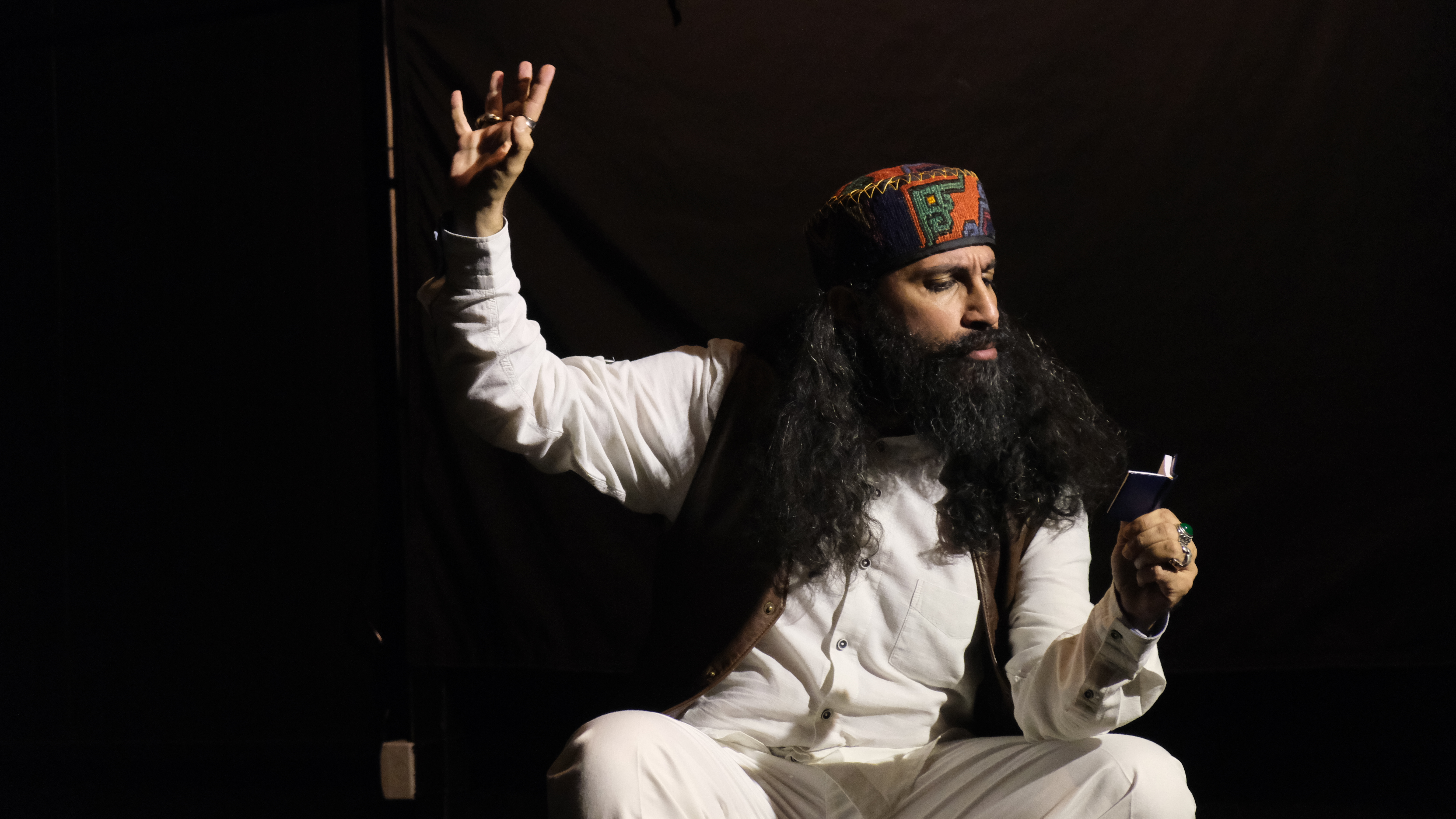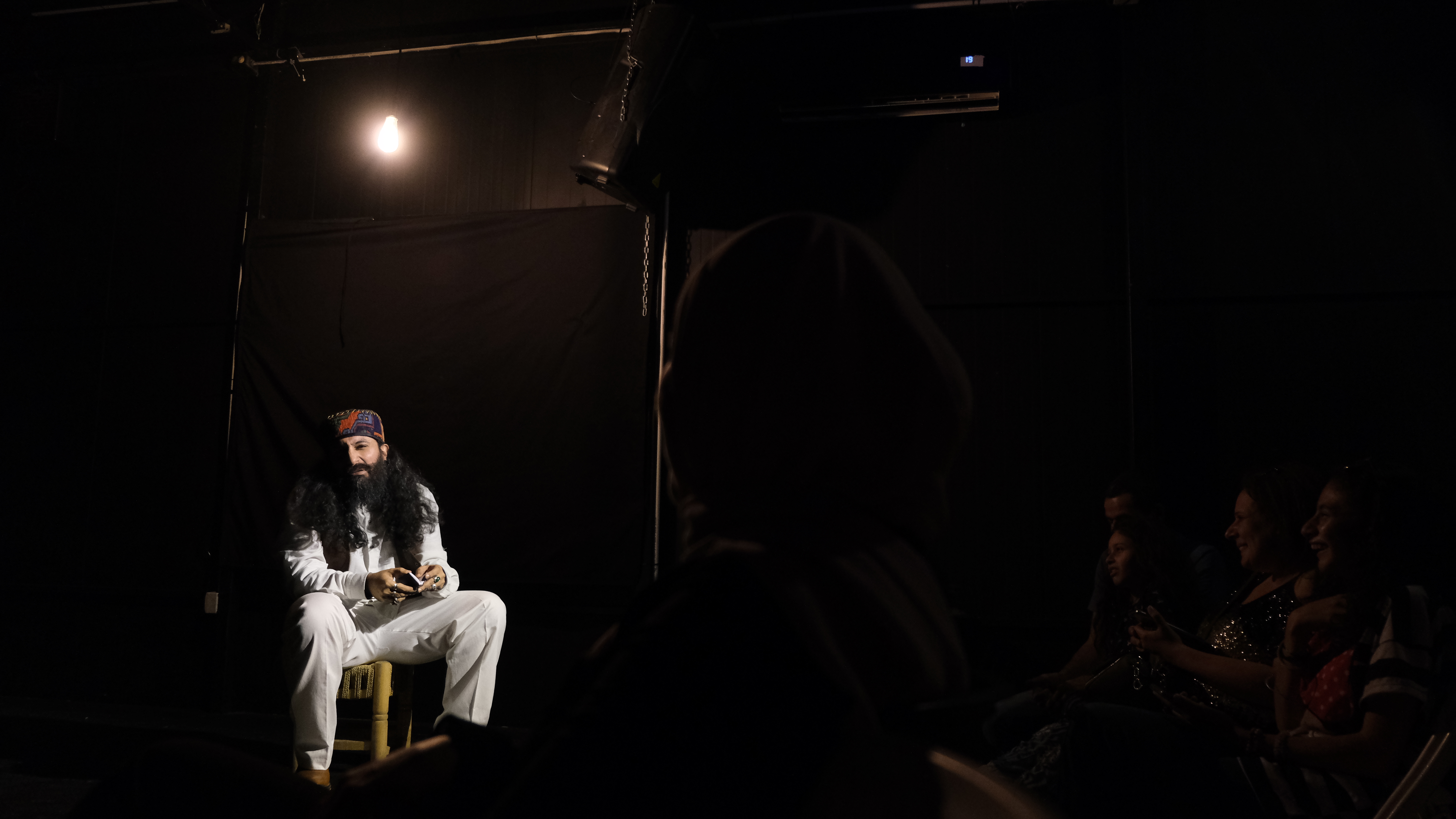He is indeed the most famous storyteller in the world. That's how "Halim Al-Hakawati" defines himself. He claims to know all the secrets of life and its stories from a very small book. Legend has it that this book contains every story that ever existed and will exist in the world. Halim shares stories from the book by performing them in reality.
Halim Al-Hakawati ('Halim the Storyteller') entered a theater full of novel enthusiasts, applauded himself, and read three stories from his very small book, and the strange thing is that these stories were suggested by the audience themselves. "I want to hear a story about the 'Benefits of the chinaberry tree", they said, so Halim chose a story from the suggestions and told us about it, then acted it out on stage.
Raffi Feghali presents his captivating performance as "Halim Al-Hakawati" in an improvisational and solo show. Raffi chose to return to Lebanon after 6 years to perform on June 2023, in "Laban", the improvisational theatrical institution he founded in 2009
During the performance, Halim engages in a phone conversation without using an actual phone, speaking to his girlfriend, then seamlessly shifting between roles as he acts as the girlfriend. He even portrays driving a non-existent car, yet he makes the illusion become vividly real before our eyes. While he succeeds in some endeavors, each time Halim realizes that his small book doesn't encompass the entirety of the world's stories, he playfully blames the musician and sound engineer for its limitations.
This enigmatic storyteller is real, he bears resemblance to many narrators and storytellers who claim to possess the ultimate truth. The show concludes without reaching the resolution of the story, prompting Halim to once again request the audience to enthusiastically applaud him, more than the musician and sound engineer.
 Halim Al-Hakawati in an improv storytelling theatre performance
Halim Al-Hakawati in an improv storytelling theatre performance
What is the purpose of a solo, improv theatrical performance?
Raffi Feghali masterfully presents his captivating performance as "Halim Al-Hakawati" in an improvisational and solo show. Returning to the Lebanese stage after six years, Rafi, a versatile theater performer, trainer, and peace advocate, showcased "Halim Al-Hakawati" in June 2023 at Laban Studio, the improvisational theatrical institution founded by Rafi himself in 2009. The solo show was one he first experimented with in Latvia, where he had to do an improvisational show alone due to the absence of one of the performers from the show.
"The authorities usually reject the show when I tell them it has no script. I invite them to attend the performance, perhaps hoping they'd intervene and prompt a reconsideration of censorship laws in Lebanon. But they of course never attend" – Raffi Feghali
Improv theater is a form of theater that transcends scripted performances and unfolds spontaneously – one where a person performs without prior scene preparation or scripted dialogue. While this challenge alone could be daunting, the solitary nature of the performance makes it more difficult. However, what we may not know about this type of theater is that it is not solely about individual creativity, but it evolves to become a way of life, fostering participation and exchanging and sharing ideas. It is an art form that is often misunderstood, especially if the story's conclusion remains open-ended. "Some people see improvisational theater as less important than others because it does not require script preparation, but it is one of the most challenging forms of theater, requiring extensive exercises," Feghali says in an interview with Raseef22.
Can improvisation be practiced?
Improvisation has been a part of human expression since ancient times. In the realm of theater, it falls under "commedia dell'arte", a form of comedic improvisational theater. In the past, directors would provide actors with a basic outline, a short performance, and then the dialogue would be improvised. However, the practice of improvisation is a long process that transformed and evolved, giving rise to various forms of improvisational theater. Among the most notable pioneers in this field were Keith Johnstone in London and Canada, and Viola Spolin in Chicago, both making significant contributions during the 1950s. Fheghali tells us that their work coincided as they sought to find solutions to certain challenges and thus were able to further develop improvisational theater.
Keith's inspiration came from when he was watching a wrestling match and the audience's enthusiastic engagement caught his attention. This sparked his curiosity and he questioned: Why couldn't theater generate a similar response and captivate the audience's attention? Thus, in 1977, the concept of Theatresports Institute emerged, aiming to enhance interaction with the audience and create a more dynamic theatrical experience.
Raffi believes that the absence of improvisational theater in Lebanon and the Arab world is partly due to the general censorship imposed on unscripted performances
At the same time, Viola Spolin was exploring ways to involve children in theater by devising interactive games. Over time, her son, Paul Sills, took these games and began performing them in front of audiences, transforming them into training exercises for improvisation. These exercises encompassed various activities such as role-playing, storytelling, playing ball, and other entertaining interactions. Paul Sills went on to establish "The Second City" in Chicago at the time, a renowned improvisational theater school and performance venue that has nurtured numerous comedic talents, including Tina Fey and Steve Carell.
Why don't we see improvisational theater in Lebanon and the wider Arab region much?
"I watched a performance featuring three individuals. It was a long, improvised show. I couldn't even breathe. It was one of the most beautiful performances I had ever witnessed. I remember the shape of the buildings, the white cars, and the house they inhabited. I could imagine everything they were doing as if they had a fully furnished and decorated stage. In that moment, I realized it was impossible to claim that Lebanon is a culturally rich country without the presence of improv theater," tells us Raffi Feghali, describing his reaction after watching a show in Amsterdam in 2009. Inspired by this experience and after participating in impromptu street performances in Lebanon without formal improvisational training, Feghali established "Laban", an improvisational theater institution in 2009, because there was no dedicated space for daily improvisational performances.
Some improvisational theater performances were launched in Lebanon through "Laban", and then a few groups emerged in the Arab world, like Egypt and the UAE, but its presence remains limited, particularly in establishing institutions dedicated to this art form
Some improvisational theater performances were launched in Lebanon through "Laban", and after that, a few groups emerged in the Arab world, like in Egypt and the UAE. However, the presence of improvisational theater remains limited, particularly regarding the establishment of training and educational institutions dedicated to this art form. "In Lebanon, prior to each performance, I would approach the authorities to discuss the show and seek approval. Their usual response would be to see the written script. I would tell them I did not have a script, and they would reject the show. I would come back after a while and share the script of 'Hamlet' with them, and they would accept. On several occasions after obtaining approval, I've informed them that the play is improvisational and lacks a script. I also invited them to attend the performance, perhaps hoping they would intervene and prompt a reconsideration of censorship laws in Lebanon. However, they of course never attend," explains Raffi. He believes that the absence of improvisational theater in Lebanon and the Arab world is partly due to the general censorship imposed on unscripted performances.
One of the captivating aspects of improvisational theater is its simplicity and the freedom it offers to challenge conventional theatrical forms, as it does not impose any specific messages on the audience or the scene.
This applies in the Arab world and Lebanon in different forms, but the other reason may be due to the lack of sufficient experience of improv theater in the Arab world, which contributes to a misunderstanding of the meaning of this type of theatre. Viewers may attend expecting a specific message from the show, but improvisational theater does not always contain a specific message.
A show with no message
One of the captivating aspects of improvisational theater is its simplicity and the freedom it offers to challenge conventional theatrical forms, as it does not impose any specific messages on the audience or the scene. "Take what you want from it." It allows viewers to interpret and engage with the performance as they wish. According to Feghali, this attribute makes improvisational theater extraordinary and one of the most beautiful art forms. Improvisation urges individuals not to appropriate art, or interpret it, as it grants the audience the autonomy to derive their own favorite impressions. Even if a performance lacks a specific message, it becomes a living experience for the performer, transcending the immediate moment on stage and in front of the audience.
Improvisational theater is unique because it is artistically accessible to everyone. "Anyone can learn improvisation. Anyone can practice any form of art, in my opinion. But improvisational art makes the ability to create accessible to all. Improvisational art can be likened to what YouTube did for filmmaking; while 90% of the videos on YouTube may not be exceptional, 10% of them can be exceptional. Similar to YouTube, improvisational theater caters to individuals who have never had the means to produce large-scale theatrical productions due to financial or production constraints, for example," says Feghali. Furthermore, improvisational theater offers benefits in developing essential life skills such as leadership, adaptability, active listening, and communication. Feghali adds, "I know individuals who engage in improvisation exercises to enhance their personal and professional lives without necessarily showcasing those skills on stage."
 Halim Al-Hakawati in an improv storytelling theatre performance
Halim Al-Hakawati in an improv storytelling theatre performance
Perhaps the beauty of improvisational theater lies in its ability to reinterpret art in its simplicity, just as it began. Take, for instance, "Halim Al-Hakawati", who fearlessly makes mistakes on stage or embarks on a story or narrative without giving it a conclusive ending. Yet, the audience, in turn, learns not to expect finality or an ending at all times, prompting a re-evaluation of the mind's adaptability and the profound connection between theater and daily reality. Perhaps the main message lies in challenging and surpassing conventional norms and all that is traditional, as well as the fear of making errors. Hence, we witness performers who fearlessly embrace mistakes during their training, "rather, he practices the sport of accepting the ideas of his fellow performers, and expanding upon them," explains Feghali.
Perhaps the beauty of improvisational theater lies in its ability to reinterpret art in its simplicity, just as it began, like "Halim Al-Hakawati" who fearlessly makes mistakes on stage or begins a story or narrative without giving it a conclusive ending..
Keith Johnstone says, "There are those who prefer to say 'yes,' and those who prefer to say 'no.' Those who say 'yes' are rewarded with the adventures they undertake. Those who say 'no' find solace in the safety and security they get in return." The sport of modifying, augmenting, adding, and diverging from the script before a large audience is a testament to accepting life in all its forms, far from inviting the audience to specific social or political agendas.
Nevertheless, presenting this art form within our Arab world remains a challenge, contending with censorship and restrictions that may fear unresolved narratives with no ending, or misconstrue our storytelling choices as having a predetermined direction. Feghali says, "During my early shows around the world, I realized that if you come from the Arab world, or from Lebanon in particular, it is almost impossible to create content without it assuming a political dimension. Every aspect of our lives and daily struggles is inherently political. There were instances where I had no way to escape from that."
Raseef22 is a not for profit entity. Our focus is on quality journalism. Every contribution to the NasRaseef membership goes directly towards journalism production. We stand independent, not accepting corporate sponsorships, sponsored content or political funding.
Support our mission to keep Raseef22 available to all readers by clicking here!
Interested in writing with us? Check our pitch process here!



